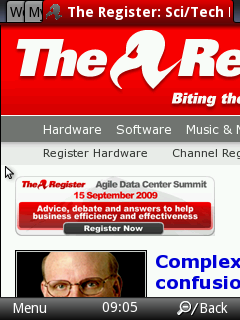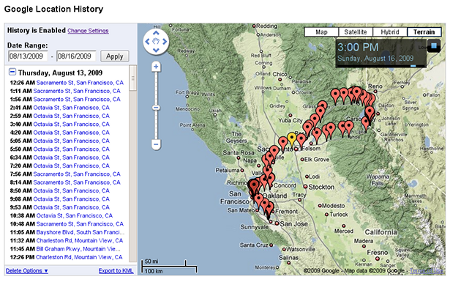Original URL: https://www.theregister.com/2010/03/01/opera_jon_interview/
Opera's Jon Von Tetzchner on browser choice, the iphone and Google
The highlights
Posted in Software, 1st March 2010 14:21 GMT
Interview In a wide-ranging interview today Opera chairman Jon von Tetzchner talked about the Browser Choice ruling, Opera's iPhone app, Google as a competitor, and how P2P will be the next generation of the web. Rather than pad it out with waffle, here are the highlights with signposts.
On the EC's Browser Choice screen
The Commission has impressed us. Microsoft is a very big company and the European Commission is a fairly small group of people. A lot of people weren't expecting this decision.
Bundling alternative browsers with Windows was rumoured to be one of the solutions around ten years ago, along with opening up the Windows source code. Then came the 2000 election, a change of administration, and the case was settled about two minutes after that.
It shows the importance of regulation, that the rules are there for a reason. Like a referee in a football match, nobody really challenges their right to be there.
Now people have a choice of a faster, more secure browser. We hope people will try it out, we think we'll come out well if they do. It's also good for Microsoft, too. IE has improved a lot. It now passes the ACID2 standards test for example.

Opera chairman Jon Von Tetzchner
[Ed's note: the new randomised browser choice screen doesn't appear if you have FireFox selected as a default browser, only if IE is the default. But it does appear on Windows XP and Vista, not just Windows 7. And it doesn't appear on Mac.]
So we have four browser cores and they should compete on standards, not succeed because one works and another doesn't. These four browser cores are not going away.
On Chrome
You know what Chrome means? It's plating, a skin. That's what Chrome is.
I often say there hasn't been a new browser in ten years. People are surprised by this, but there hasn't been a new browser core for ten years. Chrome and Safari are the same, they're both based on kit, and webkit is based on work by KDE.
Google has done a fair amount of work. It's written its own JavaScript engine, to be fair.
On the per-process model
We actually tried that ten years ago - in Opera for BeOS. The BeOS team were very keen on threading.
We can do that now, but we find f you do things the Google way, you use a lot more memory. It's much more resource-heavy if each page is its own process.
On the browser as an application platform
It's very positive. What Google calls HTML5 is really a lot of other standards. There's SVG, for example.

Opera Mini:
Coming to an iPhone near you?
What happened was that people were using the web browser for application when it wasn't really built to be one. In the very early days the web browser was a document viewer, there was no scripting. Then people added plug-ins very early on. Then came scripting. Now web browsers are being built better for applications.
For cross-platform development what other choices do you have? You can write code natively but that's a lot of platforms, especially on mobile devices. That's why getting browsers to do standards is really important.
On Google doing the right thing
We compete and we cooperate. We go on every platform we can. Google makes services and I think they understand that fragmentation is a significant problem. Yes, they have their own verticals with Android, but what they call HTML5 is an attempt to create a common platform for their services.
On the iPhone app
We have not yet submitted Opera Mini to the Apple App Store. It runs now - it's not the finished article, but it works beautifully. It's a native app written in C.
I think it will be accepted. Why shouldn't it be?
We're not running any applications within Opera Mini, and it is a great experience for iPhone users, it's a great choice to have. It saves 90 per cent on roaming costs, it's six times faster than Safari on the iPhone. Opera Mini renders information from our servers.
We start with all the sessions loaded, it's very fast. You really feel the difference on mobile networks. If you're only using your iPhone at WiFi hotspots, then what's the point of browsing on a phone?
On Opera innovation, the web everywhere
We're always been ahead of the curve. Ten years ago, we said we wanted the full web everywhere, and lots of people disagreed, they wanted a mobile web for mobile devices. Now people can see we were right.
We're already seeing Philips TVs with Opera built in. That's where Unite comes in, we think P2P is the next stage of the web everywhere.
Today a photo you take on your phone [waves E71] stays on your phone. But if each phone had an IP address, and then people could connect to you and see it. That's why we think you'll have Unite everywhere. We want to bring home the message that the web will be everywhere, in your mobile, in your GPS, in your set top box.
On Location
Location will be huge but it's early days. Some of the examples are, as you say, creepy. But it's like the early days of telephony - I was at Telenor when it was a pioneer in video telephony in the early 1990s. Telenor realised you need controls for people to turn it off - they want a shutter over the camera. They don't like that "coming out of the shower" moment. It's too much information.
Google showed an example at Zeitgeist of its Latitude location service that was creepy. They showed an engineer on vacation for a week in Mexico, and they could see he hadn't left his hotel for a week. They were joking about it. That too is too much information. But a few people will want it, so let them have it. ®
